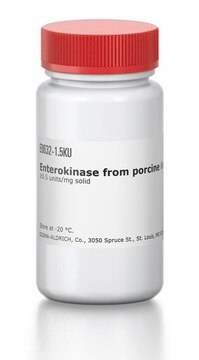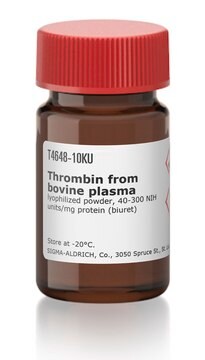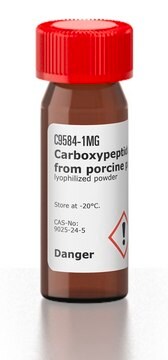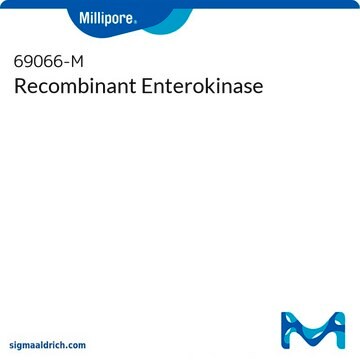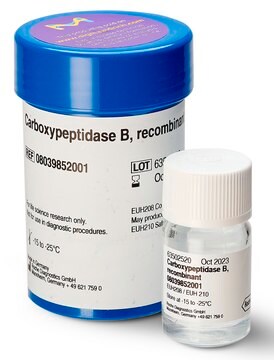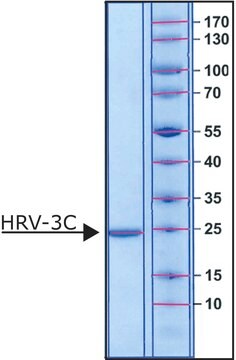E5144
Enterokinase from bovine intestine
powder
Sinonimo/i:
Enteropeptidase
Autenticatiper visualizzare i prezzi riservati alla tua organizzazione & contrattuali
About This Item
Prodotti consigliati
Origine biologica
bovine intestine
Livello qualitativo
Stato
powder
PM
150 kDa (consisting of 115kDa and 35kDa subunits.)
Colore
white
Condizioni di spedizione
dry ice
Temperatura di conservazione
−20°C
Cerchi prodotti simili? Visita Guida al confronto tra prodotti
Descrizione generale
Enterokinase also referred to as enteropeptidase, is a transmembrane protein. This intestinal protease contains a heavy chain and a light chain linked by a disulfide bond. The amino-terminal sequence of the bovine enteropeptidase is homologous to trypsin-like serine proteases. Enterokinase is a highly specific serine protease that is used for the removal of the FLAG peptide from N-terminal and Met-N-terminal fusion proteins. It does not remove the C-terminal FLAG.
Applicazioni
Enterokinase from bovine intestine has been used to remove S-Tag and N-terminal His-tag from recombinant glutathione peroxidase 1 (Gpx1). It has also been used to cleave interleukin-2 (IL-2) protein from the granules
Enterokinase is a member of the S1 peptidase family. In vivo, it is responsble for the proteolytic activation of trypsin from trypsinogen. Enterokinase is used for site specific cleavage of recombinant fusion proteins containing an accessible enterokinase recognition site for removal of affinity tags.
Azioni biochim/fisiol
Enterokinase catalyzes the proteolytic activation of pancreatic proteases. This action prevents the harmful tissue damage produced by the autoactivation of pancreatic proteases in the pancreas. Enterokinase recognizes Lys or Arg residues in the peptide. Lack of enterokinase can harm food digestion and absorption mechanism. Enterokinase is a highly specific serine protease that is used for the removal of the FLAG peptide from N-terminal and Met-N-terminal fusion proteins. It does not remove the C-terminal FLAG.
Confezionamento
Supplied with optimized enterokinase buffer
Definizione di unità
One unit is that amount of enterokinase which results in >95% cleavage of 1 µg of purified FLAG-BAP fusion protein in 18 hours at 37 °C. One FLAG-BAP unit is equal to 10x the activity of a standard trypsinogen unit.
Altre note
Do not used PVDF since free FLAG peptide will bind to the PVDF membrane.
Substrato
N° Catalogo
Descrizione
Determinazione del prezzo
Codice della classe di stoccaggio
11 - Combustible Solids
Classe di pericolosità dell'acqua (WGK)
WGK 3
Punto d’infiammabilità (°F)
Not applicable
Punto d’infiammabilità (°C)
Not applicable
Dispositivi di protezione individuale
Eyeshields, Gloves, type N95 (US)
Scegli una delle versioni più recenti:
Possiedi già questo prodotto?
I documenti relativi ai prodotti acquistati recentemente sono disponibili nell’Archivio dei documenti.
I clienti hanno visto anche
B Thomas Bäckström et al.
BMC biotechnology, 7, 3-3 (2007-01-06)
Fluorescence activated cell sorting (FACS) is a powerful technique for the qualitative and quantitative detection of biomolecules used widely in both basic research and clinical diagnostic applications. Beads displaying a specific antigen are used to bind antibodies which are then
Claude Castella et al.
Nitric oxide : biology and chemistry, 68, 125-136 (2017-02-15)
Plant glutathione peroxidases (Gpx) catalyse the reduction of various peroxides, such as hydrogen peroxide (H
Sang Youn Hwang et al.
Colloids and surfaces. B, Biointerfaces, 94, 296-303 (2012-03-09)
Encapsulation of active proteins in the hydrophilic core of vesicular liposomes is important for developing a therapeutic protein carrier system. The efficiency of liposomal encapsulation of proteins is generally low. A better understanding of the fundamental mechanisms of encapsulation is
Katrin Grage et al.
Applied and environmental microbiology, 77(18), 6706-6709 (2011-08-02)
A novel approach to produce purified recombinant proteins was established. The target protein is produced as polyhydroxyalkanoate (PHA) synthase fusion protein, which mediates intracellular formation of PHA inclusions displaying the target protein. After isolation of the PHA inclusions, the pure
Fengyun Li et al.
Analytica chimica acta, 724, 104-110 (2012-04-10)
Bioluminescence resonance energy transfer (BRET) has gained favors in recent years as a detection technology for protease activity due to its extreme reliability, high sensitivity and low intrinsic backgrounds. Because of the sensitivity of the donors, substrates and the acceptors
Il team dei nostri ricercatori vanta grande esperienza in tutte le aree della ricerca quali Life Science, scienza dei materiali, sintesi chimica, cromatografia, discipline analitiche, ecc..
Contatta l'Assistenza Tecnica.
